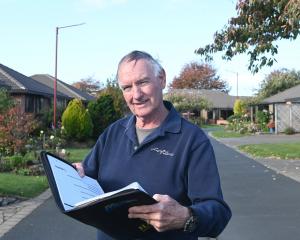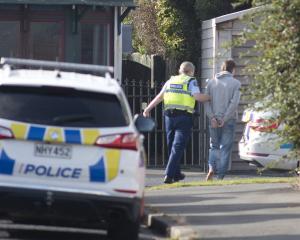There are just five short sentences left to tell the terrible but remarkable story of a Dunedin soldier's time in World War 1 France.
George Joseph Donaldson was a member of the Otago Company 3rd (Rifle) Brigade.
His family had only a few words photocopied from a report of the incident, because Mr Donaldson, his daughter Margaret Munro (89) said yesterday, "did not talk about the war''.
The report, it has been discovered, was from the book With the Machine Gunners in France and Palestine, by Major J. H. Luxford.
It was in a chapter on the battle of Cambria and the Hindenburg line in September and October 1918, shortly before the war's end.
It tells of a heroic act to save a fellow Otago soldier, and the family is keen to find out whose life Mr Donaldson saved.
It reads: "Private J. Donaldson, one of Taylor's party, performed a very gallant act.
"During some heavy shelling a comrade was pinned down by the debris of a fallen wall, and his leg shattered.
"To free the unfortunate man, Donaldson had to amputate the shattered leg with a jack-knife.
"This was done under heavy shell fire.
"Seeing that his comrade must have medical attention at once, Donaldson carried him to an aid post 400 yards away, through an absolute inferno of shell fire, and then at once returned to his gun team.''
The book's text, which the Otago Daily Times found online, also notes the wounded man eventually recovered from the injuries "and the impromptu jack-knife operation''.
Mrs Munro said her father, who was born in 1892, came from Waianakarua.
She was not certain, but he probably worked at a flour mill there.
He lived in Waianakarua until he got married, then moved to Dunedin, where he died aged 60 in 1952.
"We just put a poppy on his grave over in Andersons Bay cemetery.''
In Dunedin, Mr Donaldson worked as a linesman for the New Zealand Post and Telegraph Department.
The family lived in Grosvenor St, by the Oval, and then in Ascot St in Musselburgh.
He was, Mrs Munro said, an "absolutely wonderful father''.
"A father of seven, and in those days had a garden that grew all our vegetables. We never had to buy vegetables.''
Mrs Munro said she was born in the Depression era, and the family was self-sufficient "more or less''.
She said she usually went to a 9.30am service on Anzac Day.
The family was keen to hear from anybody who might know who the man Mr Donaldson saved was, and whether there were descendants still around.












